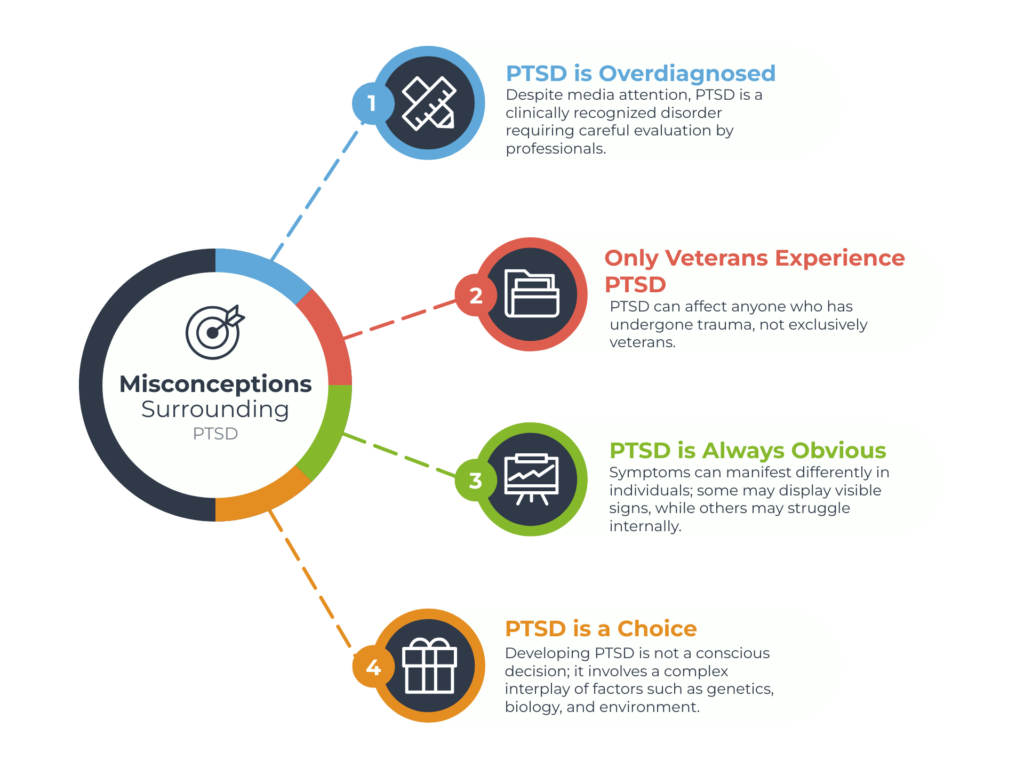Post-Traumatic Stress Disorder (PTSD) is a mental health condition that can impact individuals who have gone through or witnessed traumatic events, including natural disasters, war, car accidents, abuse, and other life-threatening situations.
Post-Traumatic Stress Disorder (PTSD) can result in physical symptoms such as nightmares, flashbacks, problems sleeping or concentrating, irritability, and physical reactions. It can also create severe emotions of helplessness and anxiety. Fortunately, PTSD sufferers can now better control their symptoms and enhance their quality of life with the help of prescription drugs. For this reason, it’s critical to learn the truths and misconceptions surrounding PTSD to have an in-depth knowledge of the illness.
This blog aims to clarify some common misconceptions and provide you with accurate information regarding Post-Traumatic Stress Disorder in this article. And then you will understand if PTSD is real.
Clarifying Common Misconceptions Surrounding PTSD:
Studying the common misconceptions surrounding Post-Traumatic Stress Disorder (PTSD) is crucial to dispel harmful notions that may hinder a nuanced understanding of this intricate mental health condition. One prevalent myth suggests that experiencing PTSD signifies a weakness in character. In reality, PTSD is a legitimate psychological response to traumatic events, affecting individuals across various backgrounds and strengths.
Another misconception implies that PTSD is overdiagnosed, fueled by media attention. However, it is a clinically recognized disorder requiring careful evaluation by mental health professionals for an accurate diagnosis. Understanding that PTSD is not exclusive to veterans and that its symptoms can manifest differently in individuals underscores the importance of fostering empathy and support. Moreover, dispelling the myth that PTSD is a conscious choice emphasizes the complex interplay of genetic, biological, and environmental factors contributing to its development.

key Points:
- Misconception: PTSD is Overdiagnosed
- Reality: Despite media attention, PTSD is a clinically recognized disorder requiring careful evaluation by professionals.
- Misconception: Only Veterans Experience PTSD
- Reality: PTSD can affect anyone who has undergone trauma, not exclusively veterans.
- Misconception: PTSD is Always Obvious
- Reality: Symptoms can manifest differently in individuals; some may display visible signs, while others may struggle internally.
- Misconception: PTSD is a Choice
- Reality: Developing PTSD is not a conscious decision; it involves a complex interplay of factors such as genetics, biology, and environment.
Uncovering Truths about PTSD:
Uncovering Truths about PTSD’ is a crucial exploration into the multifaceted nature of Post-Traumatic Stress Disorder. This blog seeks to peel back the layers surrounding PTSD, revealing the authentic experiences of those affected, the genuine impact of traumatic events, and the complexities of navigating life with this condition.
By illuminating these truths, we aim to contribute to a more informed and compassionate conversation about mental health. Join us in this endeavor to deepen our understanding, challenge misconceptions, and foster empathy for those on the path of healing from PTSD.
Myth 1- Is PTSD Real?
One common misperception about post-traumatic stress disorder (PTSD) is that it doesn’t exist. People are frequently left questioning this notion of whether PTSD is a real and legitimate mental health disorder. It’s critical to dispel this fallacy and confirm that PTSD is real.
Around the world, PTSD is acknowledged by organizations and mental health professionals as a valid and important psychological reaction to stressful experiences. The effects of PTSD on a person’s mental health are real, and their experiences are legitimate. By busting the myth that raises doubt about the existence of PTSD, we may encourage more compassion, understanding, and empathy for those who are struggling with this difficult illness.
Myth 2: Veterans of the armed forces are the only ones who have PTSD.
Fact: Anyone who goes through, sees, or is exposed to a traumatic event indirectly may develop post-traumatic stress disorder (PTSD).
PTSD indeed occurs in a large number of first responders, including firefighters, police, and emergency medical technicians, as well as members of the armed forces, because of the terrible events they may encounter while performing their duties. That being said, PTSD may affect anyone who has been through a terrible event or circumstance, regardless of their line of work or employment status.
Examples of situations that might trigger PTSD include physical or sexual assault, seeing violence or death, suffering disasters such as fires or floods, and enduring life-threatening illnesses. PTSD symptoms can appear in people who have not personally experienced an awful incident but have witnessed it happen in person or through media reports.
Myth 3: Having PTSD indicates a lack of strength.
Fact 1– The truth is that weakness has nothing to do with PTSD:
It’s a common misconception to associate PTSD with weakness, but in reality, the condition has nothing to do with one’s strength or character. Post-Traumatic Stress Disorder is a psychological response to a distressing event, and its occurrence is not a reflection of an individual’s toughness or resilience.
People from all walks of life, regardless of their strength or perceived weakness, can be affected by PTSD. Understanding this fact is crucial in breaking down the stigma associated with the disorder and fostering empathy and support for those dealing with it.
Fact 2- Understanding the Reality of PTSD:
To comprehend the true nature of Post-Traumatic Stress Disorder (PTSD), it’s essential to delve into the reality of this mental health condition. PTSD is not a mere reaction to everyday stressors; instead, it stems from exposure to traumatic events such as natural disasters, war, accidents, or abuse. Individuals experiencing PTSD often undergo profound psychological and emotional challenges.
This reality emphasizes the significance of acknowledging the validity of PTSD as a genuine and complex mental health issue. Understanding that it arises from specific traumatic experiences enables us to approach those affected with empathy and support. By unraveling the layers of PTSD’s reality, we can foster a more compassionate and informed perspective, paving the way for effective support and treatment.
Fact 3- PTSD treatment works very effectively:
Many people can overcome the effects of trauma and move forward in life more easily with the support of treatment for Post-Traumatic Stress Disorder (PTSD). PTSD sufferers have been proven to benefit from a variety of therapeutic approaches.
Here are a few of them:
- Therapy based on cognitive behavior (CBT)
- Desensitization and Reprocessing of Eye Movements (EMDR)
- Exposure Counseling
- The Use of Mindfulness in Stress Reduction
Conclusion:
Although post-traumatic stress disorder is undoubtedly a severe and complicated mental health illness, it is treatable with the aid of medication, psychotherapy, lifestyle changes, self-care routines, and other supportive interventions.
Those with PTSD can acquire better-coping mechanisms and enjoy healthier lives if they receive the right assistance and treatment.







